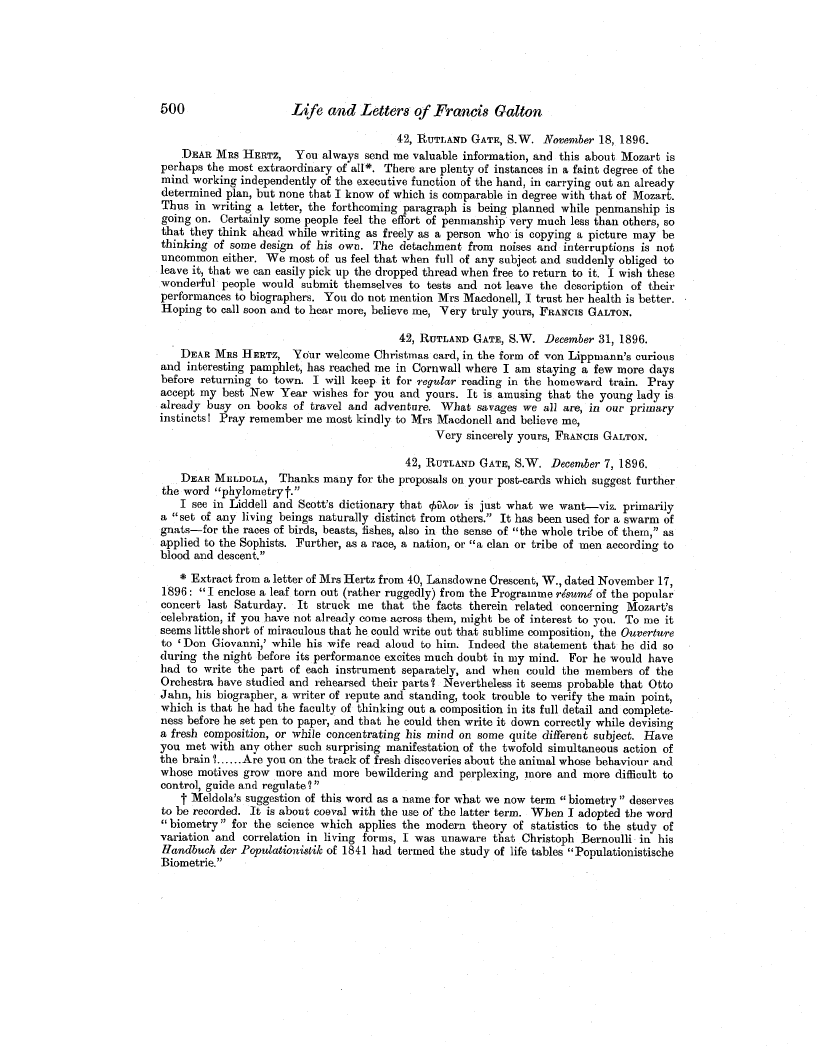| ||||||

OCR Rendition - approximate
500 Life and Letters of Francis Galton 42, RUTLAND GATE, S. W. November 18, 1896. DEAR MRS HERTz, You always send me valuable information, and this about Mozart is perhaps the most extraordinary of all*. There are plenty of instances in a faint degree of the mind working independently of the executive function of the hand, in carrying out an already determined plan, but none that I know of which is comparable in degree with that of Mozart. Thus in writing a letter, the forthcoming paragraph is being planned while penmanship is going on. Certainly some people feel the effort of penmanship very much less than others, so that they think ahead while writing as freely as a person who is copying a picture may be thinking of some design of his own. The detachment from noises and interruptions is not uncommon either. We most of us feel that when full of any subject and suddenly obliged to leave it, that we can easily pick up the dropped thread when free to return to it. I wish these wonderful people would submit themselves to tests and not leave the description of their performances to biographers. You do not mention Mrs Macdonell, I trust her health is better. Hoping to call soon and to hear more, believe me, Very truly yours, FRANCIS GALTON. 42, RUTLAND GATE, S.W. December 31, 1896. DEAR MRS HERTZ, Your welcome Christmas card, in the form of von Lippmann's curious and interesting pamphlet, has reached me in Cornwall where I am staying a few more days before returning to town. I will keep it for regular reading in the homeward train. Pray accept my best New Year wishes for you and yours. It is amusing that the young lady is already busy on books of travel and adventure. What savages we all are, in our primary instincts! Pray remember me most kindly to Mrs Macdonell and believe me, Very sincerely yours, FRANCIS GALTON. 42, RUTLAND GATE, S.W. December 7, 1896. DEAR MELDOLA, Thanks many for the proposals on your post-cards which suggest further the word "phylometry f." I see in Liddell and Scott's dictionary that OiXov is just what we want-viz. primarily a "set of any living beings naturally distinct from others." It has been used for a swarm of gnats-for the races of birds, beasts, fishes, also in the sense of "the whole tribe of them," as applied to the Sophists. Further, as a race, a nation, or "a clan or tribe of men according to blood and descent." * Extract from a letter of Mrs Hertz from 40, Lansdowne Crescent, W., dated November 17, 1896: "I enclose a leaf torn out (rather ruggedly) from the Programme resume of the popular concert last Saturday. It struck me that the facts therein related concerning Mozart's celebration, if you have not already come across them, might be of interest to you. To me it seems little short of miraculous that he could write out that sublime composition, the Ouverture to 'Don Giovanni,' while his wife read aloud to him. Indeed the statement that he did so during the night before its performance excites much doubt in my mind. For he would have had to write the part of each instrument separately, and when could the members of the Orchestra have studied and rehearsed their parts? Nevertheless it seems probable that Otto Jahn, his biographer, a writer of repute and standing, took trouble to verify the main point, which is that he had the faculty of thinking out a composition in its full detail and completeness before he set pen to paper, and that he could then write it down correctly while devising a fresh composition, or while concentrating his mind on some quite different subject. Have you met with any other such surprising manifestation of the twofold simultaneous action of the brain? Are you on the track of fresh discoveries about the animal whose behaviour and whose motives grow more and more bewildering and perplexing, more and more difficult to control, guide and regulate?" f Meldola's suggestion of this word as a name for what we now term "biometry" deserves to be recorded. It is about coeval with the use of the latter term. When I adopted the word "biometry" for the science which applies the modern theory of statistics to the study of variation and correlation in living forms, I was unaware that Christoph Bernoulli in his Handbuch der Populationistik of 1841 had termed the study of life tables "Populationistische Biometrie."
|